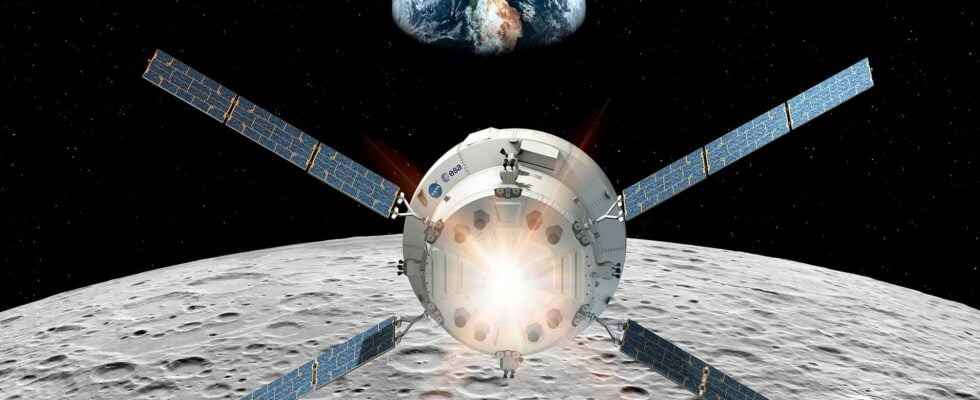You will also be interested
[EN VIDÉO] Space: how does an extravehicular activity (EVA) take place? The most famous goes back to 1969, when several men walked on the Moon, but it was not the first! © Futura
The informal meeting of European ministers responsible for space which has just been held in Toulouse resulted in announcements which give a matter ofautonomy of the use of space and in drawing the contours of the future of European policy concerning the exploration of space.
It ended with speeches by French President Emmanuel Macron and ESA Director Josef Aschbacher, who underlined that theearth observation Copernicus fully justifies the use of space to better monitor and manage our planet. They also discussed the European Commission’s projects relating to the establishment of a European constellation of connectivity and the definition of common rules for the management of space traffic. We will come back to it.
In terms of manned flightsif Emmanuel Macron did not make a speech ” at the Kennedy who had promised the Moon to the Americans, he called on Europe to better define its ambition in the field of exploration and raise the question of autonomous access to space.
Regarding exploration, and in a context where several countries have announced their intention tosettle permanently on the Moon and initiate the first missions to Marsthe President of the French Republic announced the creation of a group of European experts who will give their opinion on the future of exploration robotics and human. This panel of experts therefore does not aim to “build” a manned space transport system but to reflect on the possible options in terms of exploration and manned flight and the solutions that could be implemented. This group will be set up during the ESA council scheduled for March and will be made up of around ten members, all from outside ESA. They will not be technocrats or politicians, but a diversity of talents in fields as varied as history, economics, philosophy and technology.
Its conclusions and recommendations will be submitted to the Director of ESA and presented to the Ministers in charge of Space of the Member States before the Ministerial Council, scheduled for November 2022. It is therefore not this year that ESA and Europe decide to acquire a manned space transportation system.
No decision before 2025
As Didier Schmitt, proposal coordinator for the ESA Ministerial Council for Robotic and Human Exploration, explains to us, “ decisions can be taken at the Ministerial Council but Member States should not be expected to give the green light to the development of a manned transport system “. Based on the conclusions and recommendations of this expert council, ESA should ” finance studies on different options for space transport architectures, define deadlines and prices “. At the 2025 Ministerial Council, the idea is to present to Member States the ” result of these studies and to propose the development of a manned space transport system on the basis of these studies “.
In other words, if the ESA and Europe decide to embark on the adventure of manned flights, around ten years will be necessary before seeing a European crew take off on board a European vehicle. Delays which seem surprisingly long but which can be explained. As Didier Schmitt points out, “ if the green light were given today, Europe would be unable to choose the most suitable architecture “. Capsules or space planes? And on what launchers would they be flying? Evolutions of a Ariadne 6 or new launchers? And will they be usable only once, partially or entirely reusable? In addition to all these technical questions, there are other more down-to-earth ones such as destinations, necessary budgets, recurring costs, etc.
That said, by asking the question of the autonomy of access to space, Emmanuel Macron somehow puts the Member States of the European Union (EU) before their responsibility. Do they wish to continue to finance American private companies and foreign agencies so that European astronauts can go into space aboard private launchers? If we leave access to space to “foreign” actors only, then Europe will have no choice but to be an eternal partner without too much ambition.
While the United States, Russia, China, and soon India (in 2023) have developed and operated their own vessels, ” it is clear that Europe is lagging behind », despite the fact that it has all the skills and key technological bricks. He ” Obviously we have to catch up, but the longer we delay these decisions, the more difficult it will be to catch up with our partners and competitors. “. That said, while only France, Germany and Italy have the capacity to carry out manned flight projects, it is questionable whether the 30 countries and Member States of ESA and the EU will be able to have a position common on a manned flight program. Not as trivial a question as it sounds. Several countries see manned flight as a matter of prestige and very incidental because it brings very little scientifically and mobilizes a lot of resources for a random return on investment. Remember, in the 1980s, the ten member countries of ESA could not agree on the Hermes program.
Interested in what you just read?
